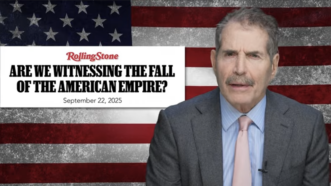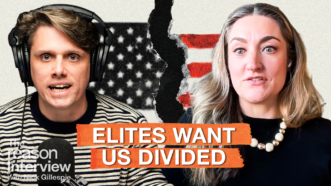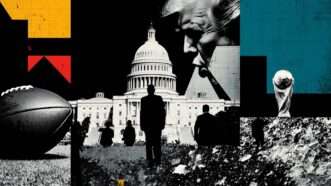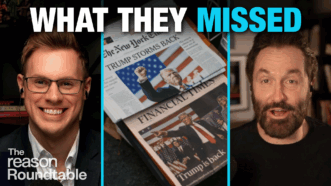Year: 2025
'Affordability' Politics Is a Major Opening for the Free Market Message in the New Year
The socialists of both parties want things to cost less. Only free markets can make that so.
If You Give a Bear a Badge, Will It Respect Your Rights?
Despite their general ignorance of constitutional law, bears pose a much less grave threat to your civil liberties than humans do.
Man Who Had Pleaded Guilty to Felony Forgery of Court Orders Sues Over Being Called "Convicted Felon"
From a Justice Department press release as to the original forgery: "Michael Arnstein's blatant criminal scheme to exploit the authority of the federal judiciary for his company's benefit was outrageous. As Arnstein has learned, his attempts to remove negative reviews about his business from Google search results by forging a U.S. District Court judge's signature may have worked in the short term, but it also earned him nine months in a federal prison."
The Big Lesson of the 2020s? Don't Ignore the Economists.
From COVID-19 lockdowns to Biden's inflation and Trump's tariffs, bad things have happened when economics are sidelined in policymaking.
Study: Short-Form Video Isn't Rotting Your Brain
A recent meta-analysis concerning short-form video, mental health, and attention spawned a lot of tech panic. Did critics even read the study?
Department of Homeland Security
DHS Says REAL ID, Which DHS Certifies, Is Too Unreliable To Confirm U.S. Citizenship
It's the punch line to a bad joke that started 20 years ago when Congress passed the REAL ID Act.
Yale Journal on Regulation Symposium on the 20th Anniversary of Kelo v. City of New London
I co-edited the symposium along with Eric Claeys and David Schleicher, and am also one of the contributors.
Cato Institute Looking to Hire an Executive Power Scholar
An opportunity to work at the nation's leading libertarian think tank.
With Eddington, Hollywood Finally Starts To Reckon With the Madness of 2020
Ari Aster’s pandemic satire is the movie of the year.
Trump Bars 5 Europeans From the U.S. Over Their Censorship Efforts
Creeping authoritarianism in the European Union gets pushback from an administration that has its own rocky relationship with free speech.
Open Thread
What’s on your mind?
The Real Reason Golden Ages Collapse—and How the U.S. Can Avoid It
Past societies tried to regulate their way to stability. But it came at a great cost.
How Politicians and Cops Tried To Dodge Responsibility in 2025
Presidents, legislators, and police officers were desperate to blame anyone but themselves.
School Employees' Lawsuit Claiming "Equity Training" Violated First Amendment Can Go Forward
So holds a majority of the Eighth Circuit federal court of appeals, sitting en banc.
Is the President Subject to the Posse Comitatus Act?
An issue left unresolved in Trump v. Illinois.
The Minnesota Welfare Fraud Story Is Really About a Broken Medicaid Bureaucracy
Federal Medicaid policy creates little incentive for states to stop potential fraudsters. Fixing that should be the priority, not demonizing Somali immigrants.
Reflections on a Visit to Israel
I spent two weeks teaching and lecturing in Israel. Here are some tentative impressions.
The Politics of Permanent Outrage
Lauren Hall looks at the roots of political tribalism, why voters feel trapped between false choices, and how radical moderation offers a way out of constant polarization.
Unlearning History
Three decades after Massachusetts ended its disastrous experiment with rent control, voters are considering giving the policy another shot.
6 Ways Sports and Politics Will Collide in 2026
From college sports to league expansion, politicians are going to have plenty of sway over sports next year.
These Progressives Seek to 'Disempower' the Courts
Is unfettered majority rule actually a good idea for the left to embrace?
Zohran Mamdani Didn't Run on 'Affordability.' He Ran Against Prices.
Price controls don't solve economic problems; they disguise them. Prices are messages, and Mamdani wants to shoot the messenger.
Open Thread
What’s on your mind?
What the Media Didn't Tell You in 2025
The Reason editors examine the most underreported stories of 2025 across politics, economics, global affairs, and culture.
Innocent Man Sues for Over $60,000 After Police Blew Up His Business. A Court Says He's Entitled to Nothing.
It is yet another ruling that shields the government from liability for damages caused by law enforcement.
These Companies Want To Use AI To Make Cheaper and Cleaner Energy—If the Government Lets Them
Don't blame AI for your high electricity bill. Blame the politicians who are trying to take AI away.
The TRUMP AMERICA AI Act Is Every Bit As Bad As You Would Expect. Maybe Worse.
Sen. Marsha Blackburn’s latest is an anti-tech omnibus, combining years' worth of dangerous policy ideas into one big, bad bill.
Journal of Free Speech Law: "The Curious Case of Benjamin Gitlow," by Ronald K.L. Collins
From the "Gitlow v. New York at 100" symposium, held this year at the Arizona State University Sandra Day O'Connor College of Law.
This 1,300-Page Anticapitalist History Gets a Few Things Wrong
Sven Beckert's Capitalism: A Global History is...not a reliable history.
Is Zohran Mamdani Coming Around to Housing Deregulation?
New York's new mayor has moved away from some of his far-left beliefs, acknowledging that private businesses play an important role in homebuilding.
Bail Reform Faces Backlash as Policymakers Move To Require Cash Bond for Pre-Trial Defendants
Critics of cash bail say it creates a two-tiered justice system: Those who can pay maintain their freedom, while those unable to pay remain behind bars.
Open Thread
What’s on your mind?
Research Suggests People Who Work From Home Are Having More Babies
"Flexibility at work has the power to drive fertility decisions," according to researchers running a survey in the U.S. and 38 other countries.






















![alexis_15-22_MRO_D6A3634web[1]](https://d2eehagpk5cl65.cloudfront.net/img/c331x186-w331-q60/uploads/2025/12/alexis_15-22_MRO_D6A3634web1-331x186.jpg)








